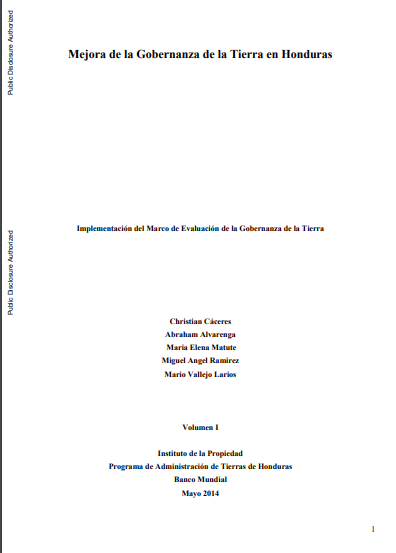The World Bank is a vital source of financial and technical assistance to developing countries around the world. We are not a bank in the ordinary sense but a unique partnership to reduce poverty and support development. The World Bank Group has two ambitious goals: End extreme poverty within a generation and boost shared prosperity.
- To end extreme poverty, the Bank's goal is to decrease the percentage of people living on less than $1.25 a day to no more than 3% by 2030.
- To promote shared prosperity, the goal is to promote income growth of the bottom 40% of the population in each country.
The World Bank Group comprises five institutions managed by their member countries.
The World Bank Group and Land: Working to protect the rights of existing land users and to help secure benefits for smallholder farmers
The World Bank (IBRD and IDA) interacts primarily with governments to increase agricultural productivity, strengthen land tenure policies and improve land governance. More than 90% of the World Bank’s agriculture portfolio focuses on the productivity and access to markets by small holder farmers. Ten percent of our projects focus on the governance of land tenure.
Similarly, investments by the International Finance Corporation (IFC), the World Bank Group’s private sector arm, including those in larger scale enterprises, overwhelmingly support smallholder farmers through improved access to finance, inputs and markets, and as direct suppliers. IFC invests in environmentally and socially sustainable private enterprises in all parts of the value chain (inputs such as irrigation and fertilizers, primary production, processing, transport and storage, traders, and risk management facilities including weather/crop insurance, warehouse financing, etc
For more information, visit the World Bank Group and land and food security (https://www.worldbank.org/en/topic/agriculture/brief/land-and-food-security1
Resources
Displaying 1706 - 1710 of 4907The Status and Impact of Bio Safety Regulation in Developing Economies Since Ratification of the Cartagena Protocol
The World development report 2010:
development and climate change highlights the link between
biotechnology, development, and environment. Aside from
recognizing biotechnology's potential to improve crop
productivity, increase crop adaptation to climatic stresses
such as drought, and mitigate greenhouse gas emissions, the
report emphasizes the need to establish science-based
regulatory systems 'so that risks and benefits can be
Hybrid Justice in Vanuatu : The Island Courts
Island courts have been in operation in
Vanuatu since 1984. Official documents have hitherto
provided little information on their practical operations or
utility, and our preliminary research in 2010 found that not
much was known at the state governance level about their
real circumstances. In 2011, we conducted fieldwork research
on five islands, Efate, Santo, Malekula, Epi, and Tanna, to
provide better information on the practical operations of
Technical Measures to Trade in Central America : Incidence, Price Effects, and Consumer Welfare
Despite the widespread tariff reductions
sparked by the Dominican Republic-Central America Free Trade
Agreement, borders in the region remain thick, with many
hurdles standing in the way of regional trade. Although
anecdotal evidence suggests that nontariff measures raise
trade costs and inhibit trade in the region, little is known
about the magnitude of these economic effects. This paper
uses a newly collected data set to quantify the incidence of
Mejora de la gobernanza de la tierra en Honduras (Spanish)
The Land Governance Assessment Framework (LGAF) is a diagnostic tool to assess the status of land governance at country level using a participatory process that draws systematically on existing evidence and local expertise rather than on outsiders.
Reducing the Vulnerability of Azerbaijan's Agricultural Systems to Climate Change : Impact Assessment and Adaptation Options
In countries such as Azerbaijan, the
risks of climate change for the agricultural sector are a
particularly immediate and important problem because the
majority of the rural population depends either directly or
indirectly on agriculture for their livelihoods. The need to
adapt to climate change in all sectors is now on the agenda
of the countries and development partners. International
efforts to limit greenhouse gases and to mitigate climate







